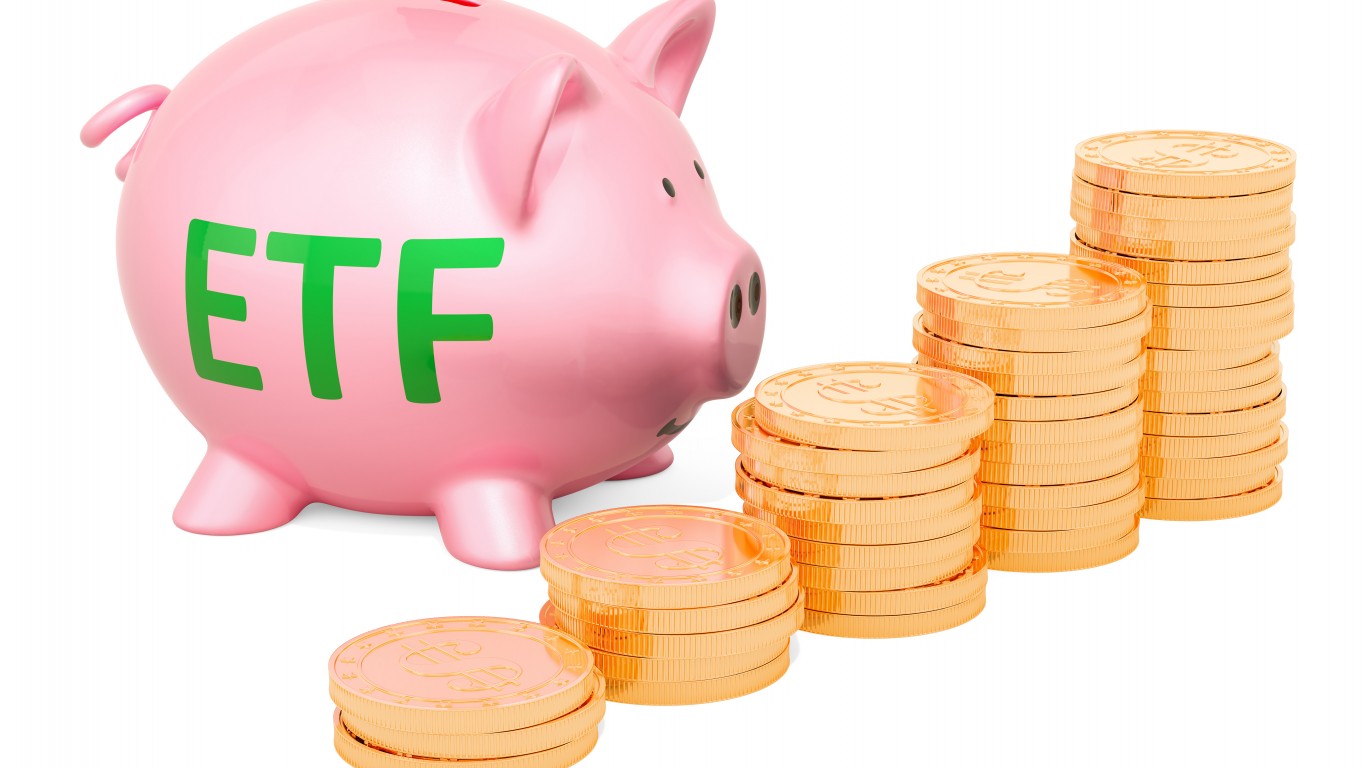

The first half of the year was one the markets would like to forget. The Standard & Poor’s 500 stocks benchmark fell about 21% in the first six months of 2022, the most of any first half of any year since 1970, while the tech heavy NASDAQ dropped nearly 30%. Bonds had their biggest selloff in four decades, while cryptocurrencies were routed.
Meanwhile, the economic indicators are not good. Inflation is running at a 40-year high of 9.1%, and there are fears of a recession. The jobs market is not looking as robust as it did earlier in the year. And the war in Ukraine drags on.
But for some, the bearish market is an opportunity for intrepid investors. 24/7 Wall St. created a list of 20 of the most common investment types, as well as explanations of common successful investment strategies based on the report 10 Common Types of Investments and How They Work, produced by financial technology company SmartAsset.
If you’re planning to dip your toe in the turbulent equity waters, you can either start your own brokerage account or hire a financial advisor. (Here are 5 tips to choosing the best wealth management firm for you.)
The first option gets you investing quickly, with the ability to buy stock, bonds, mutual funds, and more. But the decisions you make are yours alone. With the second option, the financial advisor can help you figure out an overall financial strategy and prepare you for retirement. (Here is what it costs to retire comfortably in every state.)
Investing can be an intimidating endeavor. There are many types of investments, and all require some level of experience and research. Each type of investment has a different level of risk and reward, offering various options. Investors need to determine an asset allocation that lines up with their financial goals, and weigh each type of investment and how it fits into this allocation.
Click here to see how to get the most out of 10 common investments.

1. Stocks
Stocks are also known as shares or equities and are the most well-known form of investment. When you buy a stock, you are buying an ownership stake in a publicly traded company.
[in-text-ad]

2. How to make money off stocks
Investors make money by buying stocks and selling them after the price of the stock has risen. There are tax implications when you sell a stock at a profit in the form of capital gains taxes. How much these gains are taxed depends on how long the asset was held before selling. Assets held for a year or less are short-term capital gains, while assets held for longer than a year are long-term capital gains.

3. Bonds
Bonds are debt instruments purchased from companies (corporate bonds) and local, state, and federal governments (municipal bonds, U.S. Treasury bonds, notes, and bills).
When you are shopping for bonds, you need to check out each bond’s price, time to maturity, and coupon rate. The coupon rate is the annual money you will receive, expressed as a percentage of the principal that you pay to buy the bond. Coupon rates for new bonds are around the market interest rate. Most bonds will pay out interest twice a year. The risk for bondholders is the interest rate can fluctuate, and with it the price of the bonds. Finally, while the U.S. government will likely not default, other issuers might.

4. How to make money off bonds
You make money from bonds by receiving interest payments while the money is lent. When the bond matures, you get your principal back.
[in-text-ad-2]
5. Mutual funds
Funds
A mutual fund is a financial instrument that pools assets from investors to invest in securities such as stocks, bonds, money market vehicles, and other assets. Mutual funds are overseen by money managers, who allocate the fund’s assets and attempt to produce capital gains or income for investors. Mutual funds charge annual fees, expense ratios, or commissions.
Mutual funds give small investors access to portfolios of equities, bonds, and other securities.
These funds invest in many securities, and their performance is tracked as the change in the total market capitalization of the fund. Employer-sponsored retirement plans usually invest in mutual funds.

6. How to make money off mutual funds
Funds
Investors make money from mutual funds when the value of the securities in the fund increases.
[in-text-ad]
7. Exchange-traded funds (ETFs)
Exchange-traded funds, or ETFs, track indices like the Standard & Poor’s 500 or the Dow Jones Industrial Average. They also can follow smaller indices associated with a particular market sector. Unlike mutual index funds, exchange-traded funds can be traded like stocks.

8. How to make money off exchange-traded funds (ETFs)
Funds (ETFs)
ETFs are often recommended to new investors because they are more diversified than individual stocks. And by choosing an ETF that tracks a broad index, you can further reduce your risk. You can make money from an ETF by selling it as it rises in value.

9. Certificates of deposit (CDs)
of Deposit (CDs)
Certificates of deposits are safe banking instruments available at banks and credit unions that offer higher interest rates than regular savings accounts in exchange for locking up your money for a specific period. A CD has a set term, ranging from a month to up to 10 years.
[in-text-ad-2]

10. How to make money off certificates of deposit (cds)
of Deposit (CDs)
CDs are good long-term investments for saving money. And they are safe. CD accounts are insured by the Federal Deposit Insurance Corporation up to $250,000. Even so, you have to make sure you won’t need the money during the term of the CD, as there are penalties for early withdrawals.

11. Retirement plans
Plans
Retirement plans are not a discrete category for investment but are vehicles to purchase stocks, bonds, and funds. These include employer-sponsored plans such as 401(k) and 403(b) or an individual retirement plan (IRA), of either the traditional or Roth variety.
[in-text-ad]

12. How to make money off retirement plans
Plans
Retirement plans have tax advantages. They allow you to invest pre-tax dollars (such as with a traditional IRA) and not be taxed on the money until you start making withdrawals upon retirement. The risks for the investments within a retirement plan are the same as the risks outside of a retirement plan.

13. Options
For the more sophisticated investor, options are an interesting investment product – referred to as a financial derivative. When you acquire an option, you are purchasing the right to buy or sell an asset at a certain price at a particular time. There are two types of options: call options to buy assets, and put options to sell them.

14. How to make money off options
To make money off an option, an investor locks in the price of a security, say a stock, betting that it will increase or decrease in value – depending on whether it is a call or put option. For example, in a call option, one risk is that the stock could decline in value and since you wouldn’t exercise the call option, you would lose the money spent on the option contract. Depending on the option contract, however, the risks can be far greater, as these financial instruments can be very complex.
[in-text-ad-2]

15. Annuities
An annuity is a financial contract you can sign with an insurance company in which you pay a premium, either through a lump sum or periodic payments, in exchange for guaranteed payments to be made at a later date.

16. How to make money off annuities
Annuities are considered a useful strategy to help you fund your retirement, especially if you are concerned you might outlive your savings. Annuities come in two categories: fixed and variable.
[in-text-ad]

17. Cryptocurrencies
A cryptocurrency is a digital or virtual currency secured by cryptography, which makes it nearly impossible to counterfeit. Many cryptocurrencies are decentralized networks based on blockchain technology – a database shared and synchronized, enforced by a computer network. Cryptocurrencies are not issued by any central authority, making them immune to government interference or manipulation, at least in theory.

18. How to make money off cryptocurrencies
The advantages of cryptocurrencies include cheaper and faster money transfers and decentralized systems that won’t succumb to one failure event. Some investors have used them as alternative investments to diversify their portfolios outside of stocks and bonds. As we’ve seen this past year, cryptocurrencies can have wild fluctuations and investing in them is not for the faint of heart.

19. Commodities
A commodity is a basic good used in commerce. A commodity usually refers to a raw material used to make finished goods. Hard commodities (oil, gold, and silver) are those used in energy and metals products, and soft commodities (wheat and corn) are used in agricultural goods.
[in-text-ad-2]

20. How to make money off commodities
Investors and traders can buy and sell commodities directly in the spot, or cash, market or through derivatives such as futures and options. Having commodities in your portfolio can be a hedge against inflation.
Sponsored: Find a Qualified Financial Advisor
Finding a qualified financial advisor doesn’t have to be hard. SmartAsset’s free tool matches you with up to 3 fiduciary financial advisors in your area in 5 minutes. Each advisor has been vetted by SmartAsset and is held to a fiduciary standard to act in your best interests. If you’re ready to be matched with local advisors that can help you achieve your financial goals, get started now.
Thank you for reading! Have some feedback for us?
Contact the 24/7 Wall St. editorial team.


 24/7 Wall St.
24/7 Wall St. 24/7 Wall St.
24/7 Wall St.


